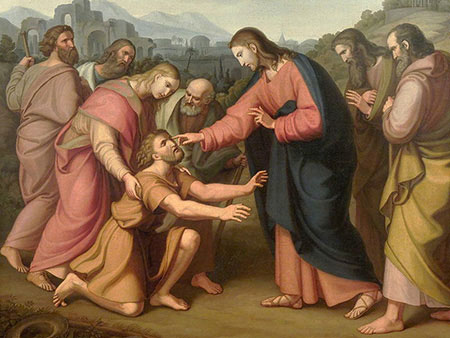‘We have been willing to make sacrifices because negligence on our part could mean death to others’
 CHARLOTTE — As people increasingly chafe against public health restrictions in place to combat the COVID-19 pandemic, it is important to practice Christian love towards others.
CHARLOTTE — As people increasingly chafe against public health restrictions in place to combat the COVID-19 pandemic, it is important to practice Christian love towards others.
That was the message from Bishop Peter J. Jugis during Mass on May 17 – a little over a week since N.C. Gov. Roy Cooper began slowly easing restrictions on non-essential business, travel and public gatherings. Churches, however, were still prohibited from allowing more than 10 people inside at a time until late Saturday, when a circuit court judge issued a temporary restraining order against enforcing the governor’s restrictions on places of worship. Thanks to the temporary order, which remains in effect for at least 14 days, churches may now offer indoor worship services with few limitations for the first time since the pandemic hit North Carolina in mid-March.
Only a couple of Catholic churches in the diocese modified their Sunday plans following the May 16 ruling and subsequent guidance from the Chancery, allowing pastors to exercise discretion in resuming indoor Masses while continuing public health protocols such as social distancing and sanitizing high-touch surfaces between services.
St. Patrick Cathedral chose to move ahead with the two outdoor Masses it already had scheduled May 17, as well as a private Mass with the bishop that was streamed live to the cathedral’s Facebook page for the people of the diocese.
In his homily for the Sixth Sunday of Easter, Bishop Jugis reflected on the day’s Gospel from John 14:15-21, in which Jesus tells His disciples, “If you love me, you will keep my commandments.”
“During this coronavirus pandemic we have been practicing Christian love in a very exceptional way,” the bishop said. “We’ve been able to make sacrifices for others and accept limitations on our activity out of love and compassion for others – out of consideration for the sick and the suffering, compassion for the dying and for those grieving the death of a family member, out of concern for the elderly and the vulnerable whose health is compromised.
“Because of our Christian love for them, we have been willing to make sacrifices because negligence simply on our part could very well mean death to others.”
Christian love is not selfish, nor is it merely a humanitarian love, he explained.
“Christian love has its starting point in God, the Triune God – the love of the Father and the Son and the Holy Spirit. That love which comes from the heart of a loving God, the Holy Spirit places into our hearts, and God transforms us because of His Presence in us.”
Jesus describes love in the two greatest commandments: “Love of God with all your heart, all your mind, all your soul, all your strength; and love of neighbor as yourself.”
That commandment to love is “so especially appropriate for us during these days,” Bishop Jugis said. Christians should be “ambassadors of that divine love.”
“During this time of stress, and some confusion and uncertainty, let us continue to be flexible and let the love of God be our guiding light,” he entreated. “As we celebrate our new life in Christ during this Easter season – as children of God, citizens of a kingdom not of this world – let the love of God which is in our hearts be seen by others in what we say and do.”
— Patricia L. Guilfoyle, editor
Pictured at top: “Healing the Blind Man” by Václav Mánes (1832)

